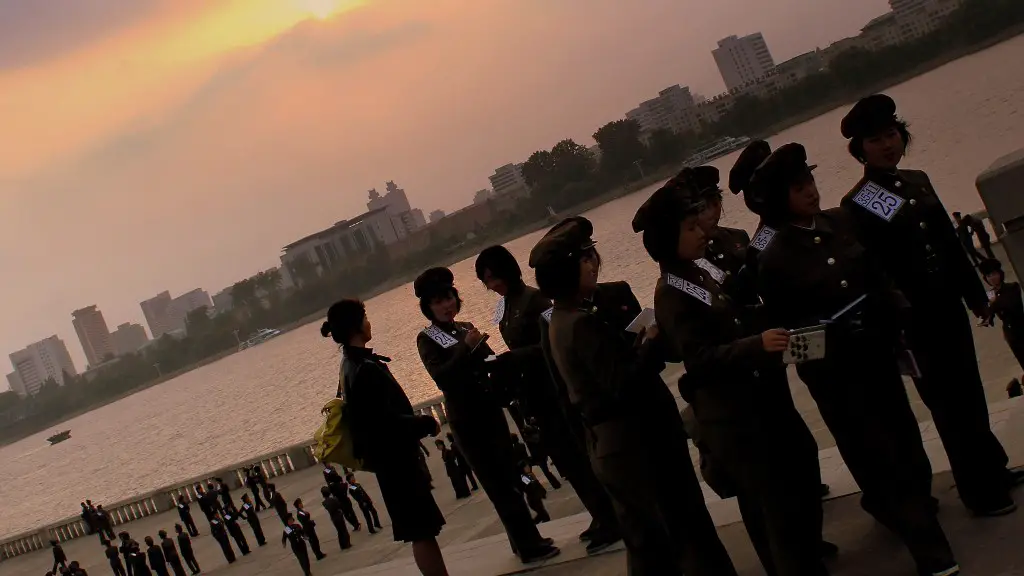Throughout the Cold War, North Korea has been a huge player on the world stage and has engaged in numerous activities to support their aggressive stance. It is commonly accepted that North Korea has achieved nuclear capability and is indeed a nuclear weapons state. It goes without saying that a country as dangerous and unpredictable as North Korea acquiring a nuclear weapon has raised many eyebrows. So, how did they end up with nuclear weapons in the first place?
In the early 1960s, North Korea began to pursue the development of nuclear weapons. By the 1970s, North Korea had a well-developed nuclear program, with assistance from other countries, such as the Soviet Union and China. North Korea’s nuclear ambitions came to a head in 1994 when the U.S. and North Korea signed an agreement, known as the Agreed Framework, which sought to curtail North Korea’s nuclear ambitions. Under the agreement, North Korea agreed not to pursue nuclear technology in exchange for economic aid and assistance with the construction of nuclear power plants.
In spite of the agreement, North Korea was still able to acquire nuclear technology through illicit trafficking of materials, as well as financial assistance from countries like Iran. By the 2000s, North Korea had developed and tested its first nuclear device and claims to have enough enriched uranium and plutonium for up to 40 nuclear weapons. North Korea’s nuclear weapons capability is a major threat to international peace and security, particularly due to the country’s erratic and unpredictable behavior.
The international community has been attempting to address the North Korean nuclear threat for many years. The US and other countries have implemented stringent economic sanctions against North Korea and have increased diplomatic pressure on the country. However, these efforts have been largely unsuccessful, as North Korea continues to ignore international calls to renounce its nuclear program. In 2017, North Korea tested its most powerful nuclear weapons to date, and in 2020 they conducted multiple missile tests, further fueling international concerns.
Experts have pointed to several factors that have enabled North Korea to acquire nuclear weapons. First, the country has benefitted from outside help, both from countries like China and Iran, as well as from private individuals and organizations. Second, the country has used its diplomatic skill and aggressive tactics to deter and distract from international efforts to contain its nuclear capability.
Finally, North Korea has benefited from its stance as a rogue state, allowing it to act without consequence or fear of retribution. North Korea has demonstrated its willingness to flout international norms in pursuit of its nuclear ambitions, and has been able to do so with relative impunity. This has enabled North Korea to continue to develop its nuclear capabilities, despite international efforts to contain it.
The Effect of North Korea’s Nuclear Weapons
The mere possession of nuclear weapons by North Korea has had far-reaching implications on international relations, with countries like the US, China and Japan being particularly affected. Not only does North Korea’s nuclear weapons capability pose an immediate threat to its neighbours, but it also creates uncertainties and potential risks for the entire region. The proliferation of nuclear weapons in North Korea has created an arms race, with other countries in the region racing to acquire their own nuclear capability in response.
Moreover, the North Korean nuclear program has also had economic implications, with economic sanctions imposed by the US and other countries causing economic hardship for the North Korean people. In addition, North Korea’s nuclear program and obstinate attitude has caused divisions within the international community, with countries like the US and China having divergent views on how to address the situation.
The effects of North Korea’s nuclear capability have been felt not just in the region, but across the globe. North Korea’s nuclear weapons capability has fueled geopolitical tensions and has raised questions about the international security system, and even sparked debates about whether the current non-proliferation regime is still relevant. North Korea’s nuclear capability has also raised questions about the efficacy of nuclear deterrence, with many experts arguing that it is not an effective way to control the country.
Finally, North Korea’s nuclear capability has also sparked debate about the feasibility of disarmament. Many experts are divided on whether North Korea can be persuaded to give up its nuclear weapons, with some arguing that it is unlikely to do so. Overall, North Korea’s pursuit of nuclear weapons has had far-reaching effects, and it is unlikely that the situation will resolve itself soon.
Reaction by the International Community
The international community has reacted strongly to North Korea’s nuclear capability. The US, in particular, has imposed heavy economic sanctions on North Korea, which have drastically impacted the country’s economy. Other countries have imposed their own sanctions on North Korea, and some have even taken more drastic measures, such as banning North Korean ships from their ports. The UN Security Council has condemned North Korea’s actions and passed multiple resolutions in an attempt to restrict its nuclear activities.
The US and other countries have also proposed various strategies to counter North Korea’s nuclear ambitions. The US-led policy of “strategic patience” involved placing pressure on North Korea to cease its nuclear activities, while also seeking diplomatic solutions. China also proposed a policy of “dual suspension”, which involves North Korea suspending its nuclear activities and the US suspending military exercises in the region.
Overall, the international community has responded cautiously to North Korea’s nuclear ambitions. While there have been some attempts to impose sanctions and diplomatic solutions, it remains to be seen whether these measures will be successful in curtailing the country’s nuclear activities. Given North Korea’s track record, it is unlikely that the country will give up its nuclear weapons anytime soon.
Implications of North Korea’s Nuclear Program
North Korea’s pursuit of nuclear weapons has had several implications for regional and international security. In the short-term, North Korea’s nuclear weapons capability has increased the risk of nuclear conflict in the region, as the country’s unpredictable and aggressive behavior has the potential to spark a regional arms race. In the medium-term, the proliferation of nuclear weapons in North Korea has given the country greater relative power and influence on the world stage.
Moreover, North Korea’s nuclear weapons program has fueled geopolitical tensions and has questioned the relevance of existing international arms control regimes, including the Nuclear Non-Proliferation Treaty (NPT). North Korea has become the first country to withdraw from the NPT, and its nuclear weapons program casts doubt on the efficacy of this treaty in preventing further proliferation in the Asia-Pacific region.
Finally, North Korea’s nuclear weapons capability has raised questions about nuclear deterrence and the ability of countries to control the proliferation of such weapons. North Korea’s sudden acquisition of nuclear weapons showcases the failure of existing international arms control regimes, and has sparked debate about the merits of nuclear deterrence and the need for a new approach to controlling the proliferation of such weapons.
North Korea’s Nuclear Ambitions in the Future
It remains to be seen what North Korea’s future nuclear ambitions will be, and how the international community will respond. North Korea has already established itself as a nuclear weapons state, which gives it a greater influence on the world stage, as well as a position of relative power. North Korea is unlikely to give up its nuclear weapons anytime soon, and any attempts to do so will most likely be met with stiff opposition.
It is likely that the international community will continue to put pressure on North Korea to curb its nuclear ambitions. The US, in particular, is likely to continue its policy of “strategic patience” and will seek diplomatic solutions to reduce tensions in the region. However, given North Korea’s track record of ignoring international calls to cease its nuclear activities, it appears that the situation is unlikely to be resolved in the near future.
The Impact on US-North Korea Relations
North Korea’s nuclear weapons capability has had a huge impact on US-North Korea relations. The US and North Korea have long been adversaries and their relations have been marked by mutual distrust and hostility. North Korea’s nuclear capability has widened the already huge divide between the two countries, and increased tensions in the region.
The US has been vocal in its opposition to North Korea’s nuclear ambitions, and has sought to impose economic sanctions on the country in an attempt to curb its activities. However, North Korea has ignored these measures and has refused to abandon its nuclear program. This has caused further divisions between the US and North Korea, and has further increased tensions in the region.
Moreover, North Korea’s nuclear program has also caused rifts within the US, with different policymakers holding different views on how to deal with the situation. There have been calls for a more aggressive approach towards North Korea, while others have argued for a more diplomatic approach. The rift has been further compounded by the US President’s lack of a clear strategy on how to address North Korea’s nuclear program.
Conclusion
It is clear that North Korea’s pursuit of nuclear weapons has had far-reaching implications, both for the region and for the international community. North Korea has been able to acquire nuclear weapons due to its illicit procurement of materials, outside help and aggressive tactics. The impact of North Korea’s nuclear capability has been felt not just in the region but across the globe, with increased geopolitical tensions and divisions within the international community.
The international community has responded with a mix of sanctions and diplomatic efforts, but it remains to be seen whether these will be successful in curbing North Korea’s nuclear ambitions. In the meantime, the US and North Korea remain at an impasse, with tensions continuing to simmer between the two sides.





